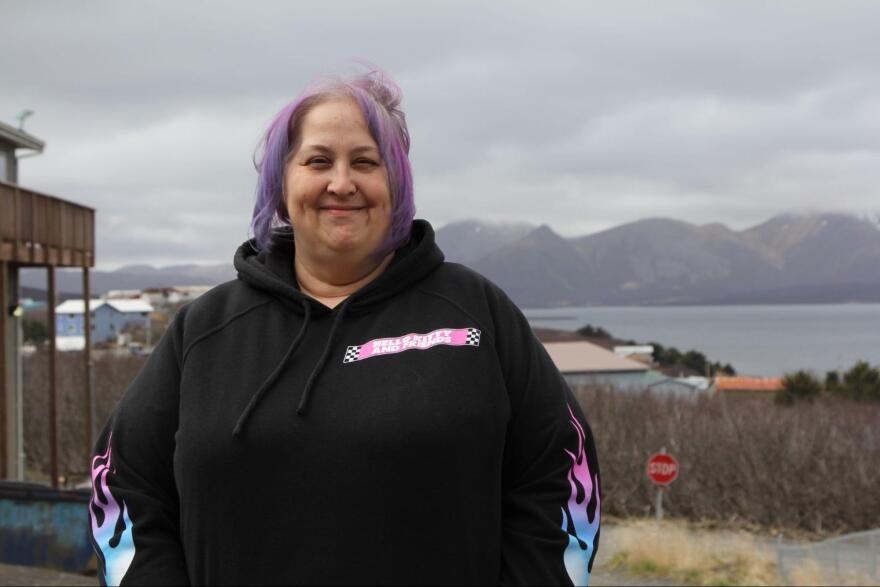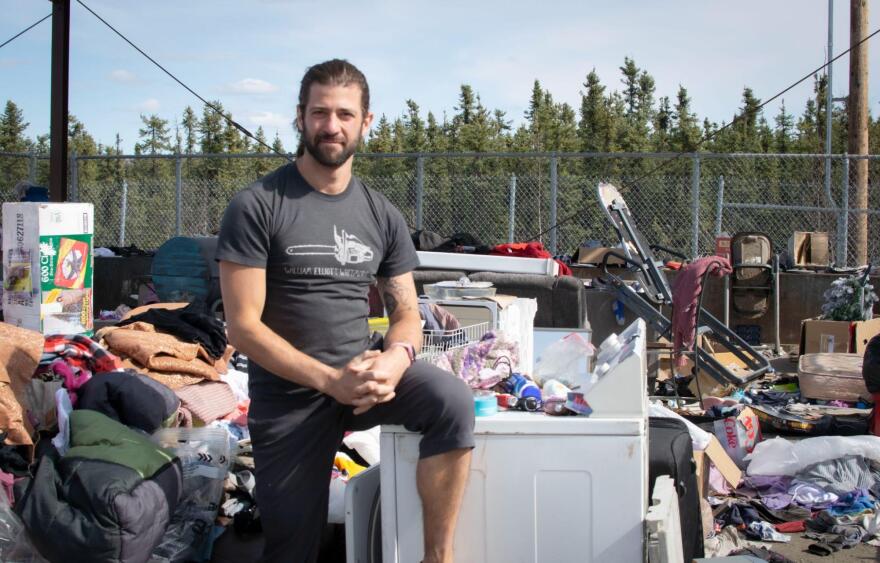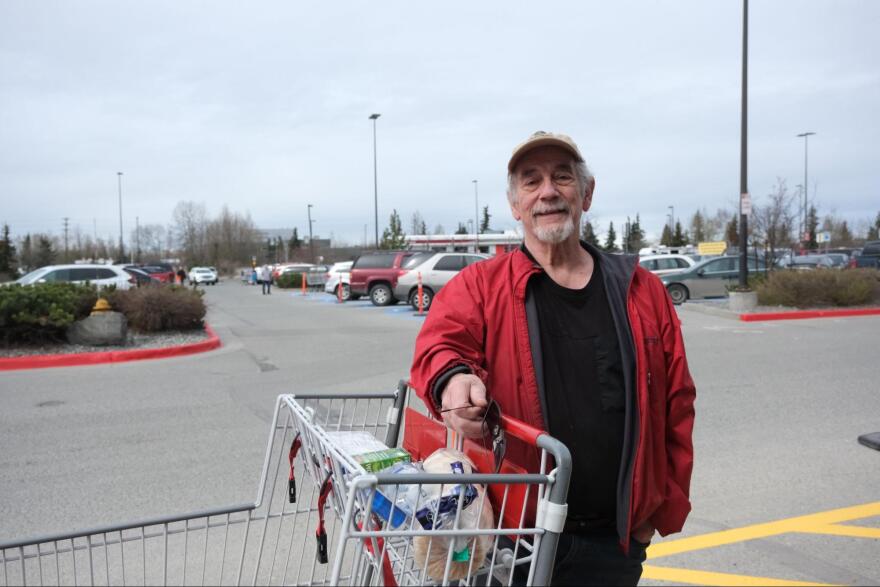It’s been more than 100 days since President Trump took office in January. That brief time has seen a torrent of sweeping changes to the federal government that could have major implications for Alaska.
Those include mass layoffs of federal workers and funding freezes for infrastructure and clean energy projects. Tariffs have introduced some uncertainty for Alaska business owners as well as communities on the Canadian border. And a broad effort to dismantle diversity, equity and inclusion programs has already forced changes at, for example, the University of Alaska.
Trump also signed an executive order promising to “unleash” Alaska’s natural resources, including fisheries, timber and energy.
It’s hard to know the full effects. Some executive orders have been held up in the courts, and the impacts of tariffs might take more time to play out. But we wanted to know what Alaskans think of it all so far.
Here’s what they had to say.
Peter Olson, Port Alsworth

Peter Olson is from Port Alsworth on Lake Clark. He was grocery shopping with his family in Anchorage on Thursday afternoon. Olson, who works in construction on the oil fields up north, said he was planning to vote for Trump in 2024 but couldn’t because of travel.
Olson said it’s too early to see how his life has changed under Trump, but overall, he’s happy with the president's actions so far. He said he can’t wait for Trump to get rid of the tax on overtime, and he’s happy with how Trump has been auditing the government.
“I really like that he's been auditing federal agencies, making sure that we know where our tax dollars are going,” he said.
Olson also said he likes the idea of tariffs, even though he thinks they might create challenges for people in the beginning.
“At first it'll hurt, but then afterwards, it'll get better in the long term,” Olson said.
Vickey McDonald, Sand Point

Vicky McDonald’s work with the Alaska Commercial Company has taken her all over the state, from Bethel to Nome. Three weeks ago she moved to Sand Point to manage the small city’s main grocery store.
She said the store has had to adapt its business practices to stay ahead of things like Trump’s tariff policies.
“Our warehouse is trying to purchase up things like bicycles, for example, that we know are going to get hit hard with tariffs. We're buying as many as we can now and warehousing them so we won't have to impact the customers by raising the prices right away,” McDonald said.
McDonald said Trump wouldn’t have gotten her vote, if she had voted.
“I didn't, but I wouldn't have voted for who's there, I could tell you that,” she said.
Nick Rasmussen, Goldstream Valley

Nick Rasmussen was at the Farmers Loop West transfer station in Fairbanks, unloading a truck full of furniture as a favor to a friend. He’s an avid rock climber, and he’s worried about what some of Trump’s executive actions could mean for outdoor recreation in Alaska.
“We don't know what's going to happen in the national parks,” Rasmussen said. “We don't know if they're going to be open or closed. We don't know if they're going to be accessible, or sold for whatever's in the ground that might be useful for the next little while.”
Rasmussen said that in the weeks after the administration’s decision to levy tariffs against most of America’s trade partners, he’s seen some prices slowly rise. Not even his climbing gear is safe.
“Black Diamond sent out an email saying all their costs are going up 10 to 25%,” he said. “That’s because all of their materials come from other places, and they have to figure out a way to keep themselves in business — but also provide that service. So, you're kind of seeing it everywhere.”
Rasmussen declined to say who he voted for in 2024, only that it was not for the current president — or for Elon Musk.
Raymond Urrea, Anchorage

Raymond Urrea moved to Alaska from Tucson, Arizona, more than 30 years ago. He used to manage a restaurant, but in recent years he’s been working as a driver for services like Lyft and Uber. On Thursday, he was at the Costco in Northeast Anchorage picking up his medicine.
Urrea voted for Trump in the last election and said he is happy about the president’s actions so far. He said the president has been working on securing the border, exposing waste in government spending, and building up trust in the government.
"With the new administration, we're seeing change happen rapidly, something that we haven't seen in forever, in my whole lifetime,” he said.
As a Latino with relatives in Mexico, Urrea said he is not against immigrants, but he thinks they are depleting the country’s resources. He says he appreciates the president’s work to secure the border.
“Law and order has to be set in place for us to have the structure and stability. Without law and order, we have chaos,” he said. “We're going in the right direction, and I'm really excited about that. I'm glad, more proud than ever again to be an American.”
Connie Newton, Cold Bay
Connie Newton, an Unangax̂ elder from King Cove, owns the Bearfoot Inn in Cold Bay, near the tip of the Alaska Peninsula. The small hotel is also the only grocery and liquor store in the city of around 35 residents. Newton said the costs of doing business have gone up during the last 100 days.
“And I have to pass it on to the customer, which I don’t like to do,” she said.
Newton said she’s worried about Trump’s decisions, which she said feel unplanned.
“It really scares me what he’s doing, with all the cuts, especially those spur-of-the-moment things,” she said. “It seems like they’re not thought out, or all the people who should be involved are involved in his decision making. I don’t see that.”
Kyle Canfield, Haines

Kyle Canfield has lived in Haines for 13 years, and he now works at Greens Creek Mine near Juneau. He headed to the Rusty Compass Coffeehouse right after he got off the plane in Haines.
He didn’t feel comfortable sharing who he voted for. But on the whole, he offered “tentative approval.” He thinks the administration is trying to address a lot of difficult problems with a long-term view, including the economy and government spending. He specifically noted an “astronomical amount of waste in our military,” which he attributed to the military’s relationship with the private sector.
But there was a caveat. Canfield said it seems the White House has tried to adopt a “hatchet solution” to some of those issues, which he doesn’t agree with and said could have short-term consequences. He specifically mentioned Trump’s move to make sweeping cuts across the federal government.
“We’ve made a lot of cuts, but as a result a lot of people who were necessary, in these hatchet solutions, have lost their jobs,” Canfield said. “I don’t like it per se, but I also think something has to be done.”
Elle Bernbaum, Fairbanks

Elle Bernbaum is a Fairbanks-based ecology field technician who studies how plants respond to climate change. She and her team stopped in Delta Junction to pick up snacks before heading out into the field.
Bernbaum’s research receives a lot of funding from the National Science Administration, which the second Trump administration has repeatedly tried to cut or freeze. Bernbaum says she fears for the future of her project, as well as other scientific endeavors around the country.
“I planned on going to grad school soon,” she said. “It would be in STEM and climate-focused studies. That will probably be put off because of funding issues.”
Bernbaum said she voted for Kamala Harris in 2024 — not necessarily because she was thrilled about the former vice president, but because any vote for Harris was a vote against Trump.
“I think that he is bad for America for a lot of reasons,” she said. “I'm just kind of angry. I have a lot of friends who are personally affected by the Trump administration because I used to work for the National Park Service, and funding cuts have been pretty significant.”
Melani Conroe, Anchorage

Melani Conroe works as a cashier at one of Anchorage’s Brown Jug stores. She’s been living in Anchorage for more than 30 years. Conroe says she voted for Trump in 2020, but she disapproves of the decisions he’s made during his second term so far.
Conroe said that since Trump became president, prices have gone up, and she is worried about losing food stamps and Medicaid. Conroe said she uses most of her paycheck to pay rent and bills.
“People have insurance. People have to put gas in their cars. They have to pay other bills, you know. They have to provide for clothes for their children and shoes and, you know — and it's just gotten so expensive, we can't do it anymore,” she said. “We're scrounging from week to week, payday to payday. And he needs to stop messing with things.... He needs to stop and help the poor, not the rich.”
Curt Meacham, Talkeetna

Curt Meacham moved to Alaska from Washington State about 15 years ago. He owns a cabin in Talkeetna that he rents through Airbnb and VRBO. As a small business owner, he said he is extremely pessimistic about Trump’s presidency and has been seeing a decline in people wanting to book his property.
“My bookings are down probably 70-80% because nobody wants to come to Alaska because they're terrified — if they come up here, is Denali going to be open? Is that Mendenhall Glacier going to be open? Is Alaska accessible? Let alone the people that are scared to drive through Canada because of Trump and the anti-American resentment due to Trump,” he said.
Meacham said he voted for Harris because he expected these changes.
Terrance Pardee, Haines

Terrance Pardee stopped to chat during a midday visit to the Haines post office. Decked out in a Trump 2025 hat, Pardee said he voted for Trump in the last presidential election – and would “do it every day” if he could. He said he is a decorated Vietnam veteran and has been both a business owner and elected official in Haines.
Pardee’s biggest takeaway from the first 100 days of the Trump administration was simple.
“I’ve got much more hope for my country now,” he said.
He has appreciated the White House’s direction on issues ranging from border security and immigration to national defense and the economy, which he said was “in shambles, thanks to Biden.” He also praised Tesla CEO and Trump advisor Elon Musk, who he thinks has done a fair job at finding and addressing corruption, fraud and abuse.
“We’ve got to let him do his job,” Pardee said, referring to Trump. “And anybody else that shoots their mouths off about things being better without him is absolutely crazy.”
Walter Lord, Fairbanks

Walter Lord was at the transfer station in Fairbanks, too, browsing through some discarded furniture. Lord, a retired electrician, is Iñupiat and a member of the Arctic Slope Regional Corporation. He voted for Democrat Kamala Harris in 2024. He said he’s deeply unhappy about the first hundred days of the new administration and disheartened to see the administration propose income tax cuts — while also defunding social and economic development programs across the board.
“They cut all the things that help the poor and middle class, who need money way more than big corporations or billionaires do,” he said. “If you take away thousands of dollars from the billionaires, it doesn't affect them. If you take away things that benefit the poor and middle class, you're taking away food. Not allowing teachers to write off $250 for school supplies, and Meals On Wheels... I mean, you name it.”
Lord said his retirement investments have taken a hit in the wake of Trump’s tariffs and the ensuing stock market shakeup. He’s also displeased with recent executive actions to roll back diversity, equity, and inclusion initiatives, which he believes could embolden employers to discriminate against Alaska Native people.
Kenneth Gross, Haines

Kenneth Gross is 72 and has lived in Haines off and on for five decades. He’s worked as a commercial fisherman and now runs a salmon fishing and wildlife cruise charter company out of Skagway.
He said the administration has hurt his business by way of Trump’s trade war and repeated comments about annexing Canada. He said he usually gets more than 10 booking inquiries a day this time of year, but now he’s only getting one or two a week. He said he also had three three different Canadian groups cancel their bookings.
“They were very nice, and they were very apologetic, but they canceled their whole cruise,” he said. “They didn't even get a refund.”
Gross added that he doesn’t think tariffs are the only factor driving those decisions.
“It wasn't just the tariffs, I’m sure it was the threat of being annexed and all that stuff that really made them not that happy.”
Gross said he isn’t necessarily a Democrat or Republican, but that he did vote for Harris. That decision, he said, was inspired in part by the Jan. 6, 2021 attack on the U.S. Capitol.




